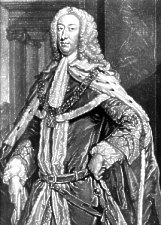

Born 28 September 1690, third son of John second marquis and first Duke of Atholl by Lady Katherine Hamilton. The title and estates descended on him by the attainder of his elder brother William, marquis of Tullibardine, following the later's part in the 1715 rebellion. James joined 1st Footguards as captain-lieutenant in Jan 1711/2 and in 1714 became captain and lieutenant-colonel. In Jan/Feb 1716 he joined the Duke of Argyll in pursuit of Jacobites marching from Perth to Aberdeen.
Elected M.P. for Perthshire in 1715 and rechosen 1722.
Succeeded to Peerage on death of father in 1724 though title was obviously questioned as an act of Parliament was passed in 1733 to extend and explain the act of 1716 by which his elder brother had been attainted and the line of descent altered.
In June 1733 made lord privy seal, rechosen in 1734 when also invested with order of garter.
Succeeded to Lordship of Man following death of James, 10th earl of Derby, in 1736, by virtue of descent as maternal great-grandson of James Stanley, 7th earl. "The succession to it was governed by the conditions under which it had been re-granted to the sixth Earl by James I., and by the provisions of the Act of Parliament which affirmed the grant. By these conditions the Island reverted on failure of heirs male to the sixth Earl to the heirs general or right heirs of James the seventh, or great, Earl of Derby. In 1726 the right heir of the seventh Earl was Lady Harriet Ashburnham, the only daughter of Lord Ashburnham by his wife Henrietta, daughter of William, ninth Lord Derby. ... Lady Harriet, however, died while she was a child, and the succession to the island then reverted to the Duke of Athole, whose maternal grandmother was daughter of the seventh Earl of Derby. In 1736, on the death of the tenth Lord Derby, the sovereignty of the little Island of Man passed accordingly to the Athole family." [S Walpole]
From 1737 to 1741 sat in Parliament both as English Baron and as a Scottish representative peer.
Fled south during the 1745 rebellion, his elder, attainted, brother took possession of Blair castle (and later died during imprisonment in the tower of London); however James then joined the Duke of Cumberland and moved northwards with him in 1746 and in February summoned his vassals to join the King's army.
Resigned office of privy seal in April 1763 when appointed lord justice general; died at Dunkeld 8 Jan 1764.
Married twice:
first marriage to Jean, widow of James Lennoy of Hammersmith and
youngest daughter of Thomas Frederick. By her had 2 sons, both of
whom died in infancy, and two daughters Jean (who married John first
earl of Crawford) and Charlotte.
Second marriage was to Jane, daughter of John Drummond of Megginch, by whom there was no issue.
As Charlotte survived her elder sister the Barony of Strange and the sovereignty of the Isle of Man descended via her, to her cousin and husband John, 3rd Duke of Athol.
With regard to his attitude towards his newly acquired Island , Spencer Walpole is very complementary:
He showed the interest which he took in his new possession by at once announcing his intention of visiting it, and of coming at a time which would enable him to be present at the annual Tynwald; and he was not discouraged by the unfriendliness of the winds, which forced him, like Duckenfield in the previous century, to seek shelter at Holyhead, and which thus protracted over six days a journey which is now accomplished in four hours. The Duke on his arrival was received by the Governor and his officers with all the state which the Island could afford, and was greeted with addresses of welcome from all classes of the people. His first Tynwald revived the splendours of the old court. The Duke was escorted to it by " three squadrons of horse militia, one bay, the second black, the third grey, well mounted and armed, commanded by their officers, and with their drums and standards, in the latter of which were embroidered the arms of the Isle;" on the hill the Bishop did homage, the officers of the Lord's Council were sworn; and at the conclusion three "great huzzas were made by the whole spectators, waving their hats in the air, and a general volley from all the militia and soldiery followed."And the, conduct of the Duke justified the warmth of the reception. He stayed in the island for some weeks, long enough to sanction fourteen Acts, or rather fourteen sections of one Act, which has sometimes been styled the Manx Bill of Rights.
....
The first of the Atholes had thus supplemented the legislation of the last of the Stanleys. The one ruler had given the people fixity of tenure; the other had curbed the power of the ecclesiastical courts, had regulated civil judicature, and had placed the sole power of taxation in the hands of the Legislature. The Atholes were destined, in the course of the next eighty years, to lose the popularity which they had acquired in the Island. They were said, and perhaps with reason, to think too much of their own rights and too little of their people's interests. But, if Manxmen knew the history of their own Island, they would at any rate except the first reigning Duke of the House from these censures. He, at least, celebrated his accession by signing an Act worthy to be bound in the same volume with the great charter of the last of the Derbys.
Dictionary of National Biography
S Walpole Land of Home Rule 1893 Chapter 13
|
|
||
|
|
||
|
Any comments, errors or omissions
gratefully received The
Editor |
||